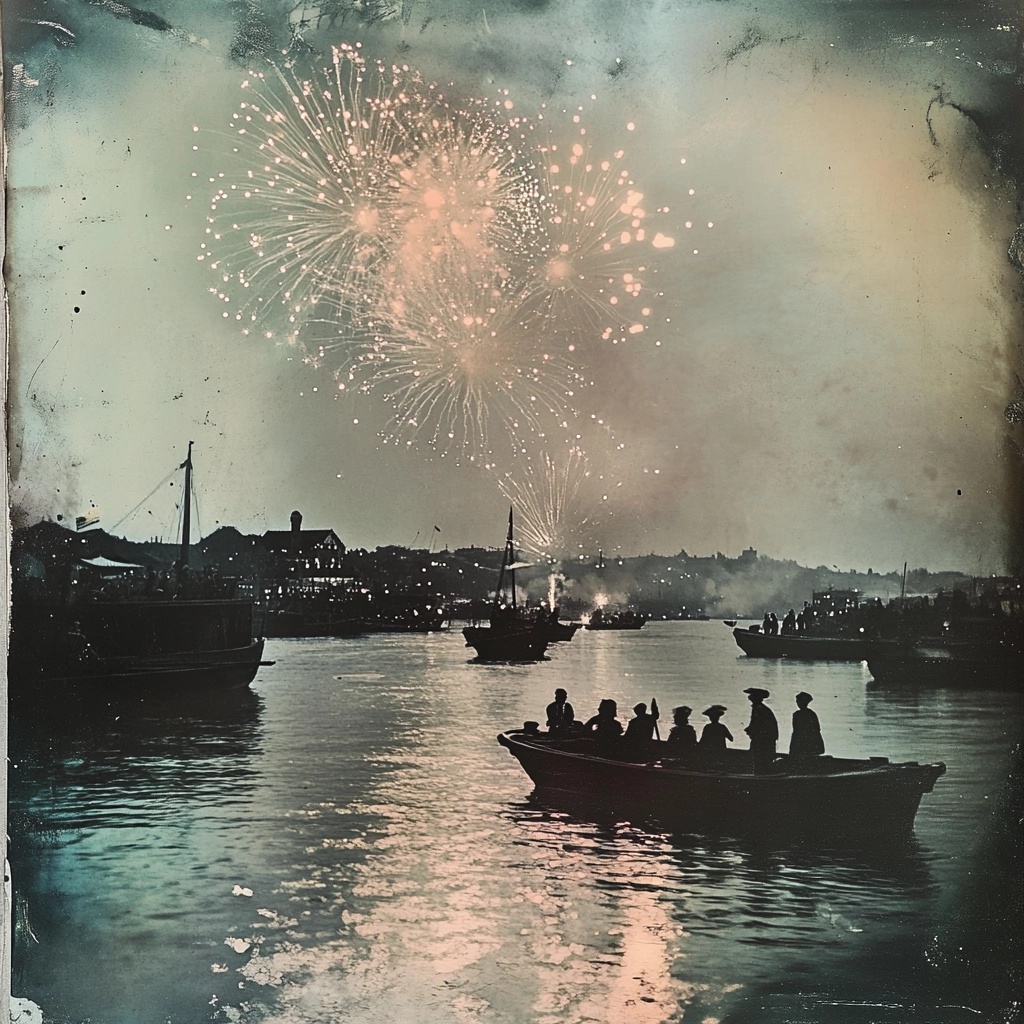THE GOAT (8)
By:
February 15, 2025

“The Goat: Cardiff, A.D. 1935” was first published in Naomi Mitchison’s 1929 collection Barbarian Stories. Compare with “The Lottery” (The New Yorker, 1948), for which Shirley Jackson would become famous. HiLoBooks is pleased to serialize the story for HILOBROW’s readers.
ALL INSTALLMENTS: 1 | 2 | 3 | 4 | 5 | 6 | 7 | 8.
Then a man came up and spoke to Tom, pulling him away and whispering to him, and after a moment Tom turned round to me: ‘We are being most kindly offered a place on one of the barges by my friend Mr. Evans,’ and he introduced us formally. When Mr. Evans was scurrying along in front of us he said into my ear: ‘I won a case for him last week: a bit of a tough, but you should have seen the other side!’ I wondered what the case was about, but couldn’t ask just then. Tom’s ex-client certainly looked capable of any of the more solid and practical forms of crime!
We went down a back street full of delightful ship-chandlers’ shops, that ended with steps down and an iron rail to hold on to. The water smelt and looked remarkably nasty, a mixture of Bristol Channel mud with the inevitable dock filth of even a modern city. Just not slipping as we got on board the barge, I couldn’t help thinking how very unpleasant it would be to be drowned in. Even if, as they all said very loud, he was drunk and warm with brandy.
The barge steamed off and round the corner to its place in a great semi-circle of them at the dock mouth. Most seemed full of the same sort of people, come to look on at this thrill, guaranteed real, no cinema effects. But there was at least one official barge as well. I was introduced to the owner’s wife, who was dressed in a tactful sort of quarter mourning with purple feathers, and obviously was much puzzled at what attitude to take up. She didn’t think her husband’s was quite nice or suitable, but could not make up the thing she called her mind, poor dear, what was! Most of the men on the barge were owners of a sort, but not yet rich enough to qualify. They laughed rather violently, and had a good many whiskies themselves. I think they were definitely more barbarian than the crowd, with a queer sort of brutality that one would never get, say, in a Balkan State, and hardly even in France. They all rushed forward into the bows as soon as there was anything to see, and the barge tipped, but no one seemed to notice.
Neither Tom nor I saw much of the actual business of the drowning of the Goat. One can imagine that sort of thing quite well enough not to have to look closely. Besides, we were too far off to see much. When I saw the group of them come down the cleared space at the dock-head, I didn’t go on looking. There was no possible psychological interest in it and as little beauty as in a real crucifixion before the artists have been at work on it. But we could tell what was happening by the crowd. When they began singing ‘All through the night’ to steady themselves. When they stopped singing altogether and umbrellas went down and faces were little and white above the dirty black of cheap clothes. The minutes that lasted, while our friends on the barge were subdued into whispered swearing and we caught ourselves listening rather too acutely. And then when it was over and one could get free of the terrible and half-religious feeling that one had felt coming on and swamping one — oh, a horrible thing! I think everyone on the barge felt something of the same relief, though they couldn’t express it adequately. But their language, such as it was, was wonderful! Mrs. Evans led me away on tiptoe into the barge’s cabin and we sucked peppermints. Yet I know it was a different kind of thing that the others felt, the dockers and the miners and the iron-workers; only what exactly it was I don’t quite know, and I suppose I never shall. It is at times like these that one understands the depth of the difference between us and them.
We didn’t go with the other millions to see the body: we’d had enough crowds by then. There was high tea with Tom’s lay client, and I talked to his wife about the diseases of canaries, I think, and how sad about the dear Prince never marrying, and how to turn the heels of knitted stockings. Then we went back to our hotel. We both slept pretty well, for, after all, plenty of men have died for the people one way and another, and plenty of one’s own friends have died, so why lose sleep over a stranger?
RADIUM AGE PROTO-SF: “Radium Age” is Josh Glenn’s name for the nascent sf genre’s c. 1900–1935 era, a period which saw the discovery of radioactivity, i.e., the revelation that matter itself is constantly in movement — a fitting metaphor for the first decades of the 20th century, during which old scientific, religious, political, and social certainties were shattered. More info here.
FICTION & POETRY PUBLISHED HERE AT HILOBROW: Original novels, song-cycles, operas, stories, poems, and comics; plus rediscovered Radium Age proto-sf novels, stories, and poems; and more. Click here.
